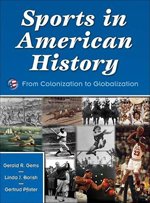Evelyn Mertin. Sowjetisch-deutsche Sportbeziehungen im “Kalten Krieg”. St. Augustin: Academia Verlag, 2009.
(The Soviet-German sport relations in the “Cold War”)
The bipolar power structures of the ‘Cold War’ suggest that there were clear concepts of friends and enemies both in East and West. These political patterns were transferred to sporting comparisons of the states involved. The analysis of the Soviet sport contacts to the German Democratic Republic (GDR), on the one hand, and to the Federal Republic of Germany (FRG), on the other hand, examins how the politically determined block constellations of the East-West conflict were mirrored in these relations. Furthermore, the study gives information about economic, cultural and political aspects and development in the framework of the bilateral relations. The ‘sport political playing field’ provided all parties the opportunity to communicate and negotiate at a non-public level. This almost secluded area of bilateral contacts allowed the perusal of own interests even if they sometimes diverged from traditional political patterns.
Following a description of the development of Soviet sport with particular consideration of the international sporting contacts as well as the history of the Soviet Union in the Olympic Movement, the bilateral relations to both the GDR and the FRG are analysed in detail. Furthermore, four selected topics of the Soviet-German sport relations (the status of West Berlin, the denomination of the NOC for Germany, the Olympic Games 1972 in Munich and the Olympic Games 1980 in Moscow) are examined in order to exemplify the transfer of foreign policy objectives on to sport politics. The analysis primarily covers the period from the late 1960s to the early 1980s and considers sources from Russian and German archives.

